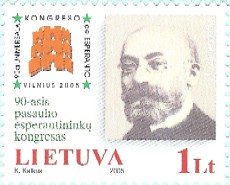 To commemorate the event, the Lithuanian post-office issued a commemorative stamp and first-day cover, showing the congress logo and L. L. Zamenhof (the initiator of the language).
To commemorate the event, the Lithuanian post-office issued a commemorative stamp and first-day cover, showing the congress logo and L. L. Zamenhof (the initiator of the language).
This was the Esperanto Association of Britain's site from 2005 to 2018. You will find its current site at esperanto.org.uk.
During the formal opening ceremony, Helen Fantom greeted the congress on behalf of the Esperanto-Association of Britain. She mentioned that from 2010, language study will be compulsory for all British schholchildren aged 7 to 11, and explained that EAB plans to use Esperanto in a language awareness curriculum, both to give insight into foreign language concepts, and as a teaching tool for English grammar. [For more details of this plan, see the Springboard to Languages programme.]
The Mayor of Vilnius, Arturas Zuokas spoke at the opening ceremony, which was attended by several ambassadors who speak or support Esperanto. The president of the Lithuanian Republic Valdas Adamkus, and the General Director of UNESCO Koichiro Matsura sent greetings. Some of the formal speeches from that opening ceremony are reported [in translation] below.
 To commemorate the event, the Lithuanian post-office issued a commemorative stamp and first-day cover, showing the congress logo and L. L. Zamenhof (the initiator of the language).
To commemorate the event, the Lithuanian post-office issued a commemorative stamp and first-day cover, showing the congress logo and L. L. Zamenhof (the initiator of the language).
This was the 90th World Esperanto Congress in a series which started in 1905 [see the centenary report] and has taken place each year, interrupted only by the two world wars. At these events, Esperantists participate in a rich programme of talks, lectures, concerts, plays and excursions, all conducted in Esperanto, and all without the need for translators or interpreters (apart from an occasional concession to the few visiting dignitaries who haven't mastered the language). For many Esperantists, the real highlight of the event is simply to meet face-to-face and chat directly with people from across the world, without having to learn their many national languages, and without imposing our own national language and culture on them.
Each year's congress is organised by Esperantists in the hosting country and the Universala Esperanto-Asocio [World-wide Esperanto Association]. Some previous congresses have taken place in Britain; in 1907 (Cambridge), 1926 (Edinburgh), 1930 (Oxford), 1938 (London), 1949 (Bournemouth), 1961 (Harrogate), 1971 (London) and 1989 (Brighton).
During the opening ceremony, Helen Fantom greets the congress on behalf of the Esperanto Association of Britain:
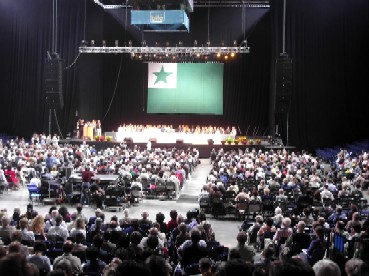
Banners, flags and posters hordings promote the event across Vilnius, and it is featured in several local and national TV and radio news programmes:
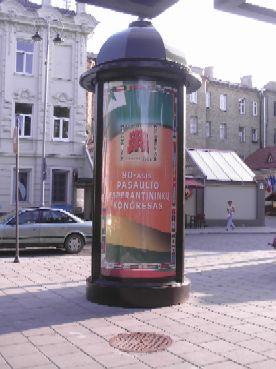
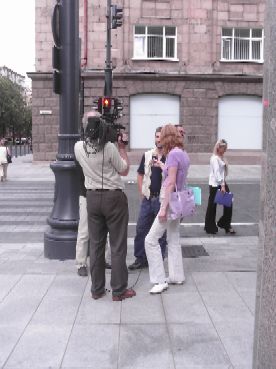
Talks and lectures (in Esperanto, of course) cover a wide range of topics. Presenters of the Esperanto programmes on Radio Cuba, Radio Poland and Radio China meet their listeners; a young Russian Esperantist takes part in the public-speaking competition.
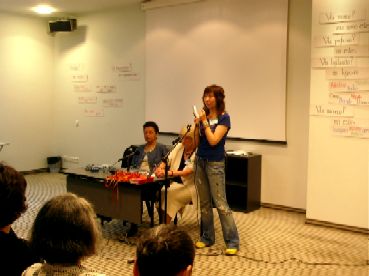
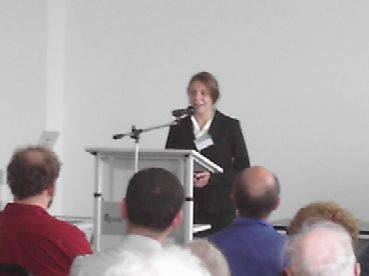
A "fashion show" presents Lithuanian national costumes and dances; a local youth group visit to perform folk songs:
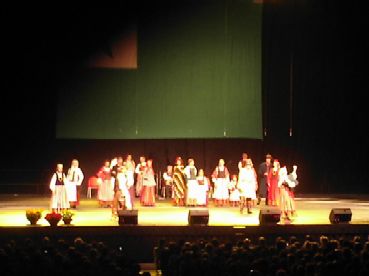
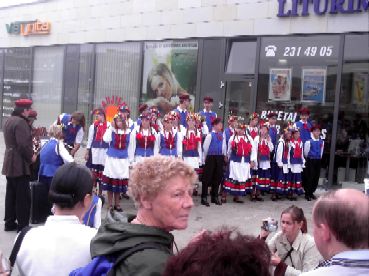
The Orchestra of St Christopher (Vilnius Chamber Orchestra) presents a selection of classical and light music pieces; the Choir of the Lithuanian Science Academy sing some folk songs (many as Esperanto translations):
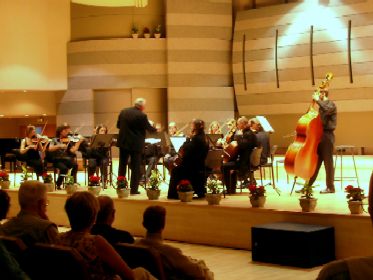
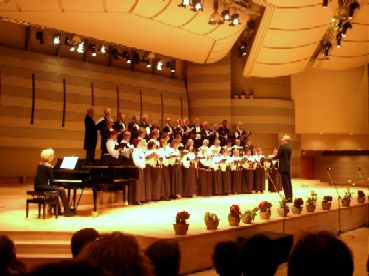
Daniel Zavier Haddard from Brazil performs some popular Brazilian standards in Esperanto and some of his own compositions; the Dutch group 'Akordo' give their distinctive unaccompanied renditions of songs ancient and modern.
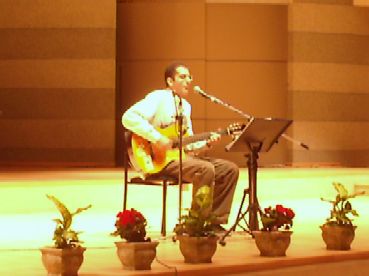
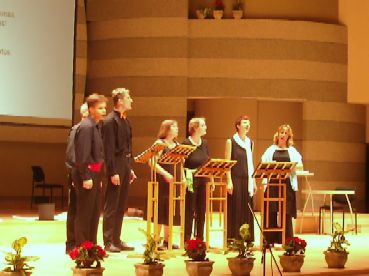
The theater group 'Shelter Scene' from Serbia perform the comedy "How to murder your wife":
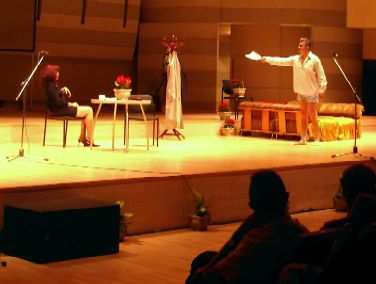
During excursions, Esperantists are shown some of the sites of Vilnius and its surrounding countryside (including the Raumsiskes open-air museum of traditional buildings):
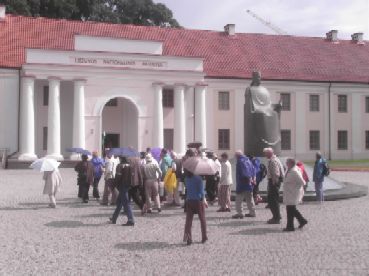
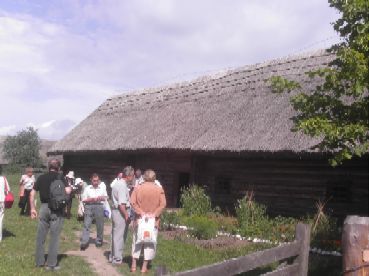
Four coach-loads of Esperantists take a trip to Kaunas, vising Zamenhof street (named after the initiator of Esperanto) where the house once owned by Zamenhof's father-in-law Alexander Zilbernik is now the local Esperanto centre; that trip is just one of the many opportunities to meet and chat with other Esperantists from around the world - here, over lunch in a Kaunas restaurant:
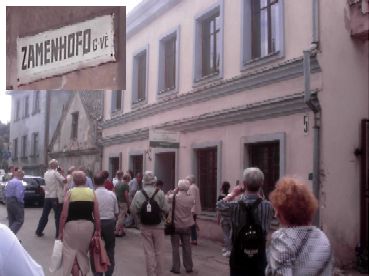
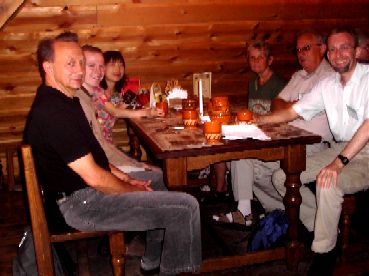
- Report and photos by Vilĉjo Walker
Message from the Director General of UNESCO, Koichiro Matsura, on the occasion of the 90th Esperanto World Congress in Lithuania.
[This is a rough English translation of the message which was, of course, presented to the congress participants in Esperanto.]
I am very happy to send this message to the 90th Esperanto World Congress, which has decided to mark and symbolise its 100th anniversary with [the theme of] cross-cultural communication.
The World Esperanto-Association and its regional associations, together with UNESCO, now have 50 years of fruitful collaboration supporting cultural and language diversity. Furthermore, since 1997 this non-governmental organisation has had formal relations with UNESCO, thus demonstrating the importance which the Organisation gives to such collaboration.
Esperanto, as we know, is a constructed planned language, which aims to ease communication between people with different languages everywhere in the world. That proposal of inter-cultural communication, open to all, is completely modern, and returns us to the dream of international consent, relating to a common language that is unifying and peaceful.
Certainly we should be happy at your desire to ease and progress the values and principles of cultural and linguistic diversity, completely in accordance with the universal declaration of cultural diversity accepted by the General Conference of UNESCO in 2001.
In fact, Esperanto, which has universal and international aims, is a unique means of bridging cultures and languages. UNESCO, on its part, cares that the cultural richness of the world, evidenced by the plurality of identities within society, which is itself multi-faceted, should always reflect renewed diversity of dialogue. On the occasion of the 100th anniversary of the Esperanto World Congress , I therefore invite the congress participants to work with the World Esperanto-Association and UNESCO to progress pluralism, from which will spring creative exchanges, which will favour cultural exchanges, and will help the communal co-existence of people and of groups with different cultural identities.
I thank the Esperanto World Congress for allowing us to unite in this event, and I wish you a very good congress.
Message from the President of the Lithuanian Republic [and patron of the congress] Valdas Adamkus.
[This is a rough English translation of the message which was, of course, presented to the congress participants in Esperanto.]
Honoured congress members and guests, I sincerely greet the participants and guests of this Congress, and all Esperantists throughout the world.
Lithuania is proud that you chose the capital of our country for as the venue for your congress. Having come here you will transform Vilnius into the capital of the world-wide Esperanto community. It's also very pleasing that this is a jubilee event - this year celebrating the 100th anniversary of the first Esperanto World Congress.
It would be difficult to find a more suitable place for the jubilee Congress than Lithuania. In our country the eminent Ludovic Zamenhof lived and worked. Here he wrote the first Esperanto text book and nursed the hope of uniting the peoples of the world. Lithuania, where diverse peoples have always lived and co-existed peacefully, holds in high esteem this, our fellow countryman, who spread the ideas of the unity of humanity.
We've already come a hundred years since that first World Esperanto Congress. Nevertheless it's evident that today the ideas of Ludovic Zamenhof are even more topical and alive. For a modern world, which is faced with more important global challenges and disagreements, it is extraordinarily important that different people, religions and cultures should preserve their identities and the same time discover means of communicating with each other.
You, Esperantists, inspire such dialogue for the 21st century, and popularise democratic international collaboration. The international Esperanto community is a perfect example of solidarity between different nations. Your organisation helps to bring peoples closer together, and instils a deeper understanding of cultural diversity.
During these days you will have a good opportunity to get to know the history, culture, heritage and customs of Lithuania. We're delighted that we can act as your hosts, show the originality of our country, and present the treasures of our culture.
I hope, that your stay in our country will be interesting and that you will experience many pleasant and unforgettable moments.
I wish your congress successful work and creative discussions.
All the best to you!
Speech by the Mayor of Vilnius, Arturas Zuokas.
[The mayor spoke, initially in Esperanto and subsequently in Lithuanian with an Esperanto translator. This is a rough English translation of the Esperanto transcription of that speech]
Bonan Matenon [Good Morning]. I know, that during meetings of Esperantists it's appropriate to speak in Esperanto, but today I will speak in Lithuanian. Esperanto was created in Lithuania, and it's important that a Word Congress of Esperantists occur in our country. And for you it is important to hear the [Lithuanian] language, which is one of the sources which the creator of Esperanto drew upon...
So I greet everyone in our city of Vilnius, who nurses the dream of a world where people are able to able to understand each other by this one language. Vilnius is an open city, and is ready to accept new ideas. I hope, that Vilnius will become a city, to which you will want to return again and again.
Message from the Israeli Ambassador to Lithuania and Latvia, Gary Koren
[Representatives from the Czech, Belgian, Chinese, Japanese and Russian ambassadors attended the formal opening ceremony of the Congress. This Israeli ambassador wasn't able to attend but sent this message. This is a rough English translation of his message which was, of course, presented to the congress participants in Esperanto.]
Mr President! Honoured Guests! Dear Friends!
I'd like to thank you for your invitation to the inauguration of the Congress, but I have to apologise that because of my departure to Jerusalem, it's not possible for me to come to Vilnius.
As an Israeli ambassador and a Jew, I have en my hard a warm place for the famous Lithuanian doctor - the creator of Esperanto - Dr Ludovic Zamenhof. I'm not completely sure what his motives were, when he conceived the idea to develop a completely new language, but it is wholly evident, even today, in this modern epoch of communication, that lack of communication is one of the main sources of misunderstanding in human society.
As a diplomat working in the United Nations, I can easily appreciate the advantages, which Esperanto, as a neutral international language, could provide, saving the great sums of money required today to translate all the declarations and documents into the six official languages of the Untied Nations, without mentioning the budget assigned by the European Union to translate all of its documents into all 20 languages of the member states.
I would like to wish you a fruitful and inspiring congress, and that you enjoy your stay in Lithuania - a country so loved and admired by Zamenhof.